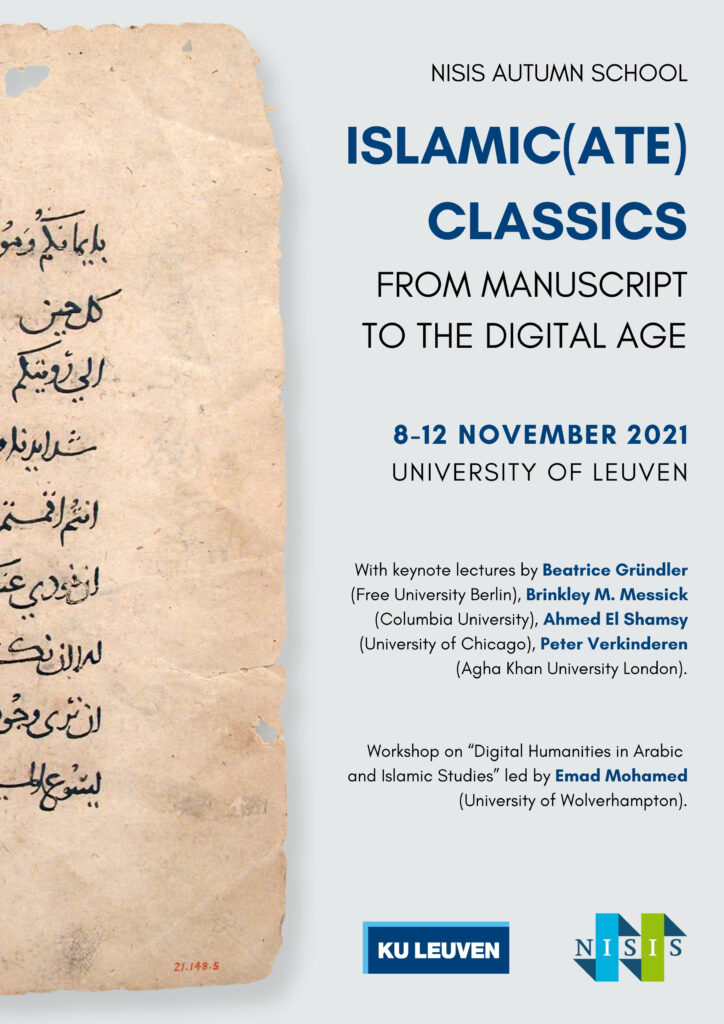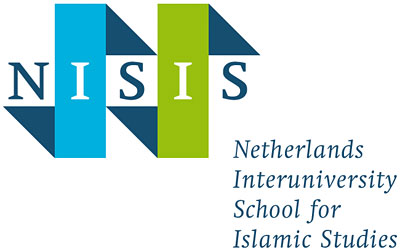Events
NISIS Autumn School 2021: “Islamic(ate) Classics: From Manuscript to the Digital Age”
Call for Application
NISIS Autumn School
Islamic(ate) Classics: From Manuscript to the Digital Age
Organized by
Arabic and Islamic Studies
Faculty of Arts – University of Leuven
8-12 November, 2021
From Monday 8 until Friday 12 November 2021, the NISIS Autumn School will be held at Leuven University. The theme of this year’s Autumn School is “Islamic(ate) Classics from Manuscript to the Digital Age.”
Inspired by Ahmed El Shamsy’s recent book, Rediscovering the Islamic Classics: How Editors and Print Culture Transformed an Intellectual Tradition (Princeton University Press, 2020), the autumn school will highlight the impact of technological changes on Islamic(ate) primary sources and scholarship not only during the printing age, but up until the current digital era as well. By ‘classics’ we roughly refer to the most significant pre-modern primary sources, which affected and continue to affect Muslim beliefs, religious duties and practices as well as ways of life in different regions.
In the Islamic(ate) learned culture manuscripts remained in normal use for many centuries and even after the invention of modern printing techniques. In recent years, digitization and the application of digital tools have started to exercise a tremendous and ubiquitous impact on the circulation and academic understanding and analysis of these classical sources.
 Invited speakers will be asked to reflect on the concept of “Islamic classics,” and how primary texts were produced, shaped, transmitted and transformed throughout Islamic(ate) book history. How did the written culture affect the circulation and interpretation of Islamic(ate) classics through the centuries of Islam? In what ways did the process and implementation of various technologies in the last two centuries transform this written culture in Muslim societies? To what extent did the physical means of printing and digital tools affect the reception and influence of these primary sources in both the Muslim world and Europe?
Invited speakers will be asked to reflect on the concept of “Islamic classics,” and how primary texts were produced, shaped, transmitted and transformed throughout Islamic(ate) book history. How did the written culture affect the circulation and interpretation of Islamic(ate) classics through the centuries of Islam? In what ways did the process and implementation of various technologies in the last two centuries transform this written culture in Muslim societies? To what extent did the physical means of printing and digital tools affect the reception and influence of these primary sources in both the Muslim world and Europe?
Keynote Speakers

©DFG/Ausserhofer
Beatrice Gründler (Seminar für Semitistik und Arabistik, Free University Berlin)

Brinkley M. Messick (The Middle East Institute, Columbia University)

Ahmed El Shamsy (Near Eastern Languages and Civilizations, University of Chicago)

Peter Verkinderen (KITAB project, The Agha Khan University London)
Workshop Digital Humanities
During the research school, Emad Mohamed (Research Institute of Information & Language Processing, University of Wolverhampton) will teach a workshop on “Authorship Attribution for the Arabic Textual Heritage.”
Authorship Attribution is a subdiscipline of Computational Linguistics that aims to assign a contested document to one of several potential authors. AA researchers have identified several features that can be considered authorial fingerprints. Each author, they claim, uses that fingerprint unconsciously and thus has no control over it. While there may not be a strong theoretical framework that explains this, the methods developed by AA have been used (successfully) in some authorial mysteries like the Federalist Papers, Shakespeare authorship, the New Testament and the Book of Mormons. AA also gave rise to the field of Forensic Linguistics, which has been employed in some significant court cases.
In this short workshop, we will look at the use of AA methods for the Arabic textual heritage.

Emad Mohamed (Research Institute of Information & Language Processing, University of Wolverhampton)
Requirements for Applications
Registration is open for PhD candidates and advanced MA students. Those whose research is germane to the topic are especially invited to contribute. Applications must include the following:
- a title and an abstract of 300 words (max.) of your presentation (15 minutes) to be given at the autumn school
- a short biography of max. 50 words in the third person
If you are not a NISIS member, your application must also include:
- a CV and a short motivation letter (ca. 1 A4)
- a one-page description of your PhD or MA project
NISIS has funds available for NISIS member to cover travel and accommodation expenses. Please note that successful applicants must arrange their own visa (if applicable), transport and accommodation.
PhD candidates and MA students can earn 3-5 ECTS in this Autumn School. For the course description, please click here.
The deadline for registration has been extended to 10 October. Registration is possible via this formor by sending an e-mail to nisis@uu.nl. When you submit your intention to attend the Autumn School please also indicate whether you would like to apply for financial support for traveling and/or accommodation.
For those who would like to attend the livestreams of the keynote lectures online, please click here for more information.
NISIS writing clinic
For NISIS junior members, we also offer our one-day writing clinic (1 EC), which will take place on Friday 12 November 2021. Together with the other participants, you will discuss a chapter of your master thesis or dissertation, or another dissertation-related paper you have finished writing or are still working on. This writing clinic will give you the opportunity to receive in-depth feedback from senior researchers other than your PhD supervisor(s), as well as from master and PhD peers.
In order to register, please send a description of the chapter you want to discuss to nisis@uu.nl. The deadline is extended to 10 October Please note that the number of available places is limited. You will receive an e-mail to inform you whether you have been selected for the clinic. If that is the case, you will be asked to send your updated chapter/paper to nisis@uu.nl around two weeks prior to the Autumn School (deadline t.b.a.). Please see the course description here.
Organizers
Arjan Post (Assistant Professor of Arabic and Islamic Studies, Faculty of Art, KU Leuven, arjan.post@kuleuven.be)
Umar Ryad (Professor of Arabic and Islamic Studies, Faculty of Arts, KU Leuven, amr.ryad@kuleuven.be )


